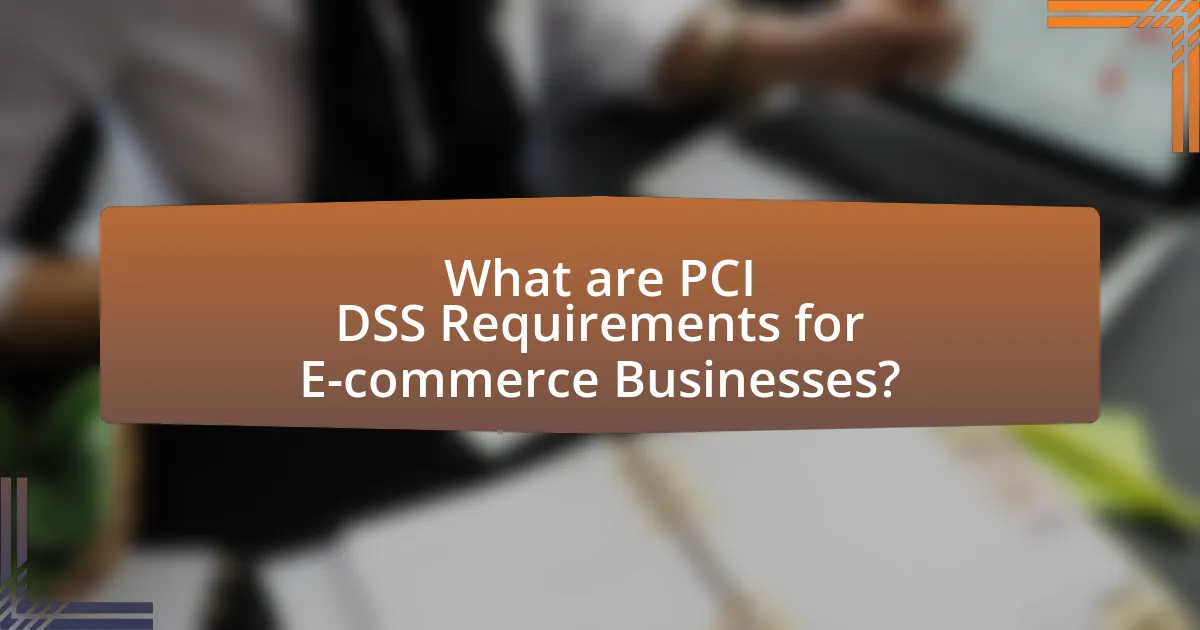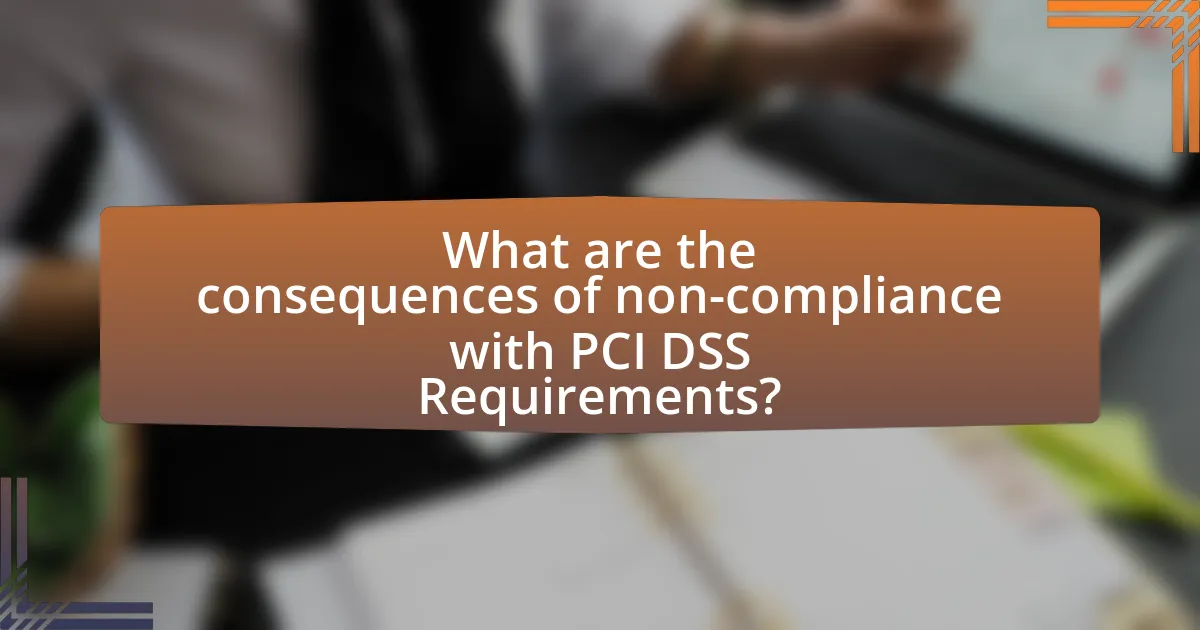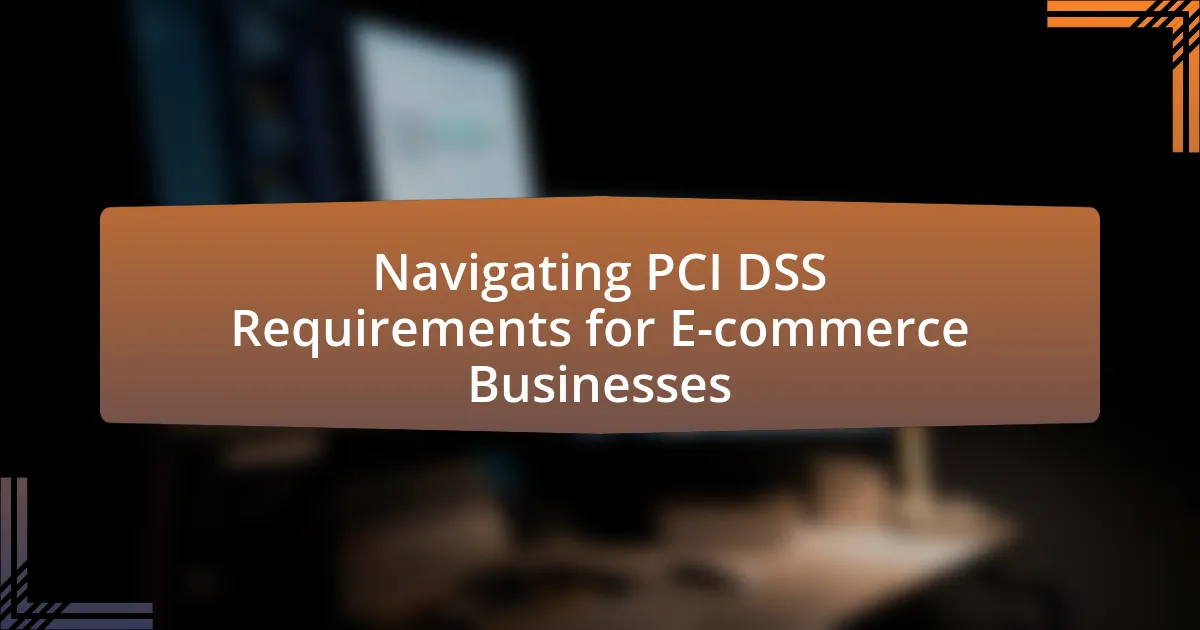The article focuses on the Payment Card Industry Data Security Standard (PCI DSS) requirements specifically for e-commerce businesses, outlining essential security standards designed to protect cardholder information during financial transactions. It details the 12 key requirements that businesses must adhere to, including building secure networks, protecting cardholder data, and maintaining a vulnerability management program. The significance of PCI DSS compliance is emphasized, highlighting its role in mitigating risks such as data breaches and fraud, while also enhancing customer trust and operational efficiency. Additionally, the article addresses common challenges faced by e-commerce businesses in achieving compliance and offers practical steps for navigating these requirements effectively.

What are PCI DSS Requirements for E-commerce Businesses?
PCI DSS requirements for e-commerce businesses include a set of security standards designed to protect card information during and after a financial transaction. These requirements encompass 12 key areas:
- Build and maintain a secure network and systems, including the installation of a firewall and the use of secure passwords.
- Protect cardholder data by encrypting transmission of cardholder data across open and public networks.
- Maintain a vulnerability management program, which includes using and regularly updating anti-virus software.
- Implement strong access control measures, ensuring that only authorized personnel have access to cardholder data.
- Regularly monitor and test networks, including tracking and monitoring all access to network resources and cardholder data.
- Maintain an information security policy that addresses security requirements and is reviewed regularly.
These requirements are essential for compliance with PCI DSS, which aims to reduce credit card fraud and enhance security for online transactions. Compliance is validated through self-assessment questionnaires or formal assessments, depending on the volume of transactions processed.
Why are PCI DSS Requirements important for E-commerce?
PCI DSS Requirements are crucial for E-commerce because they establish a framework for securing cardholder data and protecting against data breaches. These requirements help E-commerce businesses maintain customer trust, as 60% of consumers are unlikely to shop with a retailer that has experienced a data breach. Compliance with PCI DSS not only mitigates the risk of financial loss due to fraud but also avoids hefty fines from payment card networks, which can reach up to $500,000 for non-compliance. Furthermore, adhering to these standards enhances the overall security posture of E-commerce platforms, ensuring that sensitive information is handled responsibly and securely.
What risks do PCI DSS Requirements mitigate for online transactions?
PCI DSS Requirements mitigate several risks for online transactions, primarily including data breaches, fraud, and unauthorized access to payment card information. By enforcing strict security measures such as encryption, access control, and regular security testing, these requirements help protect sensitive cardholder data from cyber threats. For instance, according to the Verizon 2021 Data Breach Investigations Report, 39% of data breaches involved payment card information, highlighting the critical need for robust security protocols like those mandated by PCI DSS.
How do PCI DSS Requirements enhance customer trust?
PCI DSS Requirements enhance customer trust by establishing a standardized framework for securing payment card information. This framework mandates rigorous security measures, such as encryption, access control, and regular security testing, which protect sensitive customer data from breaches. According to a 2021 study by Verizon, organizations that comply with PCI DSS experience 50% fewer data breaches compared to those that do not. This reduction in risk fosters confidence among customers, as they feel safer when sharing their payment information with businesses that adhere to these stringent security standards.
What are the key components of PCI DSS Requirements?
The key components of PCI DSS Requirements include six main categories: Build and Maintain a Secure Network and Systems, Protect Cardholder Data, Maintain a Vulnerability Management Program, Implement Strong Access Control Measures, Regularly Monitor and Test Networks, and Maintain an Information Security Policy. Each category encompasses specific requirements that organizations must follow to ensure the security of cardholder data. For instance, the first category mandates the installation of a firewall to protect cardholder data, while the second emphasizes the encryption of cardholder data during transmission. These components are essential for compliance and help mitigate the risk of data breaches in e-commerce environments.
What are the six goals of PCI DSS?
The six goals of PCI DSS are to build and maintain a secure network and systems, protect cardholder data, maintain a vulnerability management program, implement strong access control measures, regularly monitor and test networks, and maintain an information security policy. These goals are designed to enhance the security of payment card transactions and protect sensitive data from breaches. Each goal addresses specific aspects of security, ensuring comprehensive protection for cardholder information and reducing the risk of fraud.
How do the 12 requirements of PCI DSS break down?
The 12 requirements of PCI DSS break down into six categories: Build and Maintain a Secure Network and Systems, Protect Cardholder Data, Maintain a Vulnerability Management Program, Implement Strong Access Control Measures, Regularly Monitor and Test Networks, and Maintain an Information Security Policy. Each requirement addresses specific security measures, such as installing firewalls, encrypting transmission of cardholder data, and restricting access to data on a need-to-know basis, ensuring comprehensive protection for cardholder information. These categories collectively aim to enhance security and reduce the risk of data breaches in e-commerce environments.
How can E-commerce Businesses assess their compliance with PCI DSS?
E-commerce businesses can assess their compliance with PCI DSS by conducting a thorough self-assessment using the PCI Self-Assessment Questionnaire (SAQ) relevant to their business type. This questionnaire helps identify areas of compliance and non-compliance with the PCI DSS requirements, which include securing cardholder data, maintaining a secure network, and implementing strong access control measures.
Additionally, businesses can engage a Qualified Security Assessor (QSA) to perform an external assessment, providing an expert evaluation of their compliance status. According to the PCI Security Standards Council, regular assessments and audits are crucial for maintaining compliance and addressing any vulnerabilities that may arise.
What tools are available for PCI DSS compliance assessment?
Tools available for PCI DSS compliance assessment include security assessment tools, vulnerability scanning services, and compliance management software. Security assessment tools, such as Qualys and Nessus, help identify vulnerabilities in systems that handle cardholder data. Vulnerability scanning services, like Trustwave and Rapid7, provide regular scans to ensure ongoing compliance with PCI DSS requirements. Compliance management software, such as PCI Compliance Manager and ControlCase, assists businesses in tracking their compliance status and managing documentation. These tools are essential for e-commerce businesses to maintain PCI DSS compliance and protect sensitive payment information.
How often should E-commerce businesses conduct PCI DSS assessments?
E-commerce businesses should conduct PCI DSS assessments annually. This frequency is mandated by the PCI Security Standards Council to ensure compliance with security standards that protect cardholder data. Additionally, businesses must perform assessments after any significant changes to their systems or processes, such as new payment methods or infrastructure updates, to maintain security integrity and compliance.

What challenges do E-commerce Businesses face in meeting PCI DSS Requirements?
E-commerce businesses face significant challenges in meeting PCI DSS requirements, primarily due to the complexity of compliance and the evolving nature of cybersecurity threats. The PCI DSS framework consists of 12 requirements that mandate strict security measures for handling credit card information, which can be resource-intensive and require specialized knowledge. Many e-commerce companies struggle with the costs associated with implementing necessary security technologies and maintaining ongoing compliance, as studies indicate that 60% of small businesses that experience a data breach go out of business within six months. Additionally, the rapid pace of technological change means that e-commerce businesses must continuously adapt their security practices to address new vulnerabilities, making compliance a moving target.
What common obstacles hinder PCI DSS compliance?
Common obstacles that hinder PCI DSS compliance include lack of awareness, insufficient resources, and complex requirements. Many organizations are unaware of the specific requirements set forth by PCI DSS, leading to inadequate preparation and implementation. Additionally, limited financial and human resources can impede the ability to meet compliance standards, as organizations may struggle to allocate necessary funds or personnel for security measures. The complexity of the PCI DSS framework itself can also pose challenges, as businesses may find it difficult to interpret and apply the extensive guidelines effectively. These factors collectively contribute to the difficulties faced by e-commerce businesses in achieving and maintaining PCI DSS compliance.
How can resource constraints impact compliance efforts?
Resource constraints can significantly hinder compliance efforts by limiting the availability of necessary personnel, technology, and financial resources. When e-commerce businesses face budget cuts or staffing shortages, they may struggle to implement and maintain the required security measures outlined in the PCI DSS. For instance, a study by the Ponemon Institute found that organizations with limited budgets often allocate insufficient funds for compliance-related activities, leading to increased vulnerability to data breaches. Additionally, without adequate staff training and expertise, businesses may fail to adhere to compliance protocols, resulting in potential fines and reputational damage.
What role does employee training play in overcoming compliance challenges?
Employee training plays a critical role in overcoming compliance challenges by equipping staff with the necessary knowledge and skills to adhere to regulations. Specifically, in the context of PCI DSS requirements for e-commerce businesses, training ensures that employees understand the importance of data security, recognize potential threats, and follow established protocols to protect sensitive information. Research indicates that organizations with comprehensive training programs experience a 50% reduction in compliance violations, demonstrating the effectiveness of training in fostering a culture of compliance and accountability.
How can E-commerce Businesses effectively implement PCI DSS Requirements?
E-commerce businesses can effectively implement PCI DSS requirements by conducting a thorough assessment of their current security measures and aligning them with the PCI DSS standards. This involves identifying all systems that store, process, or transmit cardholder data and ensuring they comply with the 12 PCI DSS requirements, which include maintaining a secure network, implementing strong access control measures, and regularly monitoring and testing networks.
For instance, according to the PCI Security Standards Council, organizations that fully comply with PCI DSS can significantly reduce the risk of data breaches, as compliance requires rigorous security protocols that protect sensitive payment information. Additionally, e-commerce businesses should engage in regular training for employees on security best practices and conduct periodic audits to ensure ongoing compliance.
What best practices should be followed for secure payment processing?
To ensure secure payment processing, businesses should implement encryption for sensitive data, utilize secure payment gateways, and comply with PCI DSS standards. Encryption protects cardholder information during transmission, making it unreadable to unauthorized parties. Secure payment gateways, such as those certified by PCI DSS, provide a safe environment for processing transactions, reducing the risk of fraud. Compliance with PCI DSS, which includes requirements like maintaining a secure network and regularly monitoring access to cardholder data, further enhances security. According to the PCI Security Standards Council, adherence to these standards significantly lowers the likelihood of data breaches and fraud incidents in e-commerce transactions.
How can businesses ensure ongoing compliance with PCI DSS?
Businesses can ensure ongoing compliance with PCI DSS by implementing a continuous compliance program that includes regular assessments, employee training, and updates to security measures. Regular assessments, such as quarterly vulnerability scans and annual self-assessments, help identify and address potential security gaps. Employee training ensures that staff are aware of security protocols and best practices, reducing the risk of human error. Additionally, businesses must stay updated on PCI DSS requirements, as they can evolve, and integrate necessary changes into their security infrastructure. According to the PCI Security Standards Council, maintaining compliance is an ongoing process that requires vigilance and adaptation to new threats.

What are the consequences of non-compliance with PCI DSS Requirements?
Non-compliance with PCI DSS requirements can lead to severe financial penalties, legal repercussions, and reputational damage for businesses. Organizations that fail to adhere to these standards may face fines ranging from $5,000 to $100,000 per month from credit card companies, depending on the severity and duration of the non-compliance. Additionally, non-compliance can result in increased transaction fees and the potential loss of the ability to process credit card payments, which can significantly impact revenue. Furthermore, businesses may be subject to lawsuits from customers whose data has been compromised, leading to further financial strain. According to a 2020 study by the Ponemon Institute, the average cost of a data breach is $3.86 million, highlighting the financial risks associated with inadequate security measures.
What penalties do E-commerce Businesses face for non-compliance?
E-commerce businesses face significant penalties for non-compliance with PCI DSS requirements, including fines ranging from $5,000 to $100,000 per month, depending on the severity of the violation and the volume of transactions. Additionally, non-compliance can lead to increased transaction fees, loss of the ability to process credit card payments, and potential legal liabilities resulting from data breaches. For instance, in 2020, the average cost of a data breach was $3.86 million, highlighting the financial risks associated with non-compliance.
How can non-compliance affect customer relationships?
Non-compliance with PCI DSS can severely damage customer relationships by eroding trust and increasing the risk of data breaches. When businesses fail to adhere to these security standards, customers may feel their sensitive information is not adequately protected, leading to a loss of confidence in the brand. According to a study by the Ponemon Institute, 70% of consumers would stop doing business with a company that experienced a data breach. This statistic underscores the critical importance of compliance in maintaining customer loyalty and safeguarding the integrity of customer data.
What financial implications arise from data breaches due to non-compliance?
Data breaches due to non-compliance can lead to significant financial implications, including hefty fines, legal costs, and loss of revenue. Organizations may face fines from regulatory bodies, which can range from thousands to millions of dollars depending on the severity of the breach and the regulations violated, such as the GDPR or PCI DSS. For instance, under GDPR, fines can reach up to 4% of annual global turnover or €20 million, whichever is higher. Additionally, companies often incur legal expenses related to lawsuits from affected customers and stakeholders, further straining financial resources. Furthermore, data breaches can result in reputational damage, leading to decreased customer trust and a subsequent decline in sales, which can have long-term financial repercussions. According to a study by IBM, the average cost of a data breach in 2023 was $4.45 million, highlighting the substantial financial risks associated with non-compliance.
What are the benefits of achieving PCI DSS compliance for E-commerce Businesses?
Achieving PCI DSS compliance provides significant benefits for e-commerce businesses, primarily by enhancing security and building customer trust. Compliance ensures that businesses implement stringent security measures to protect cardholder data, reducing the risk of data breaches. According to the 2021 Verizon Data Breach Investigations Report, 39% of data breaches involved payment card information, highlighting the importance of robust security protocols. Additionally, PCI DSS compliance can lead to lower transaction fees from payment processors, as compliant businesses are often viewed as lower risk. Furthermore, compliance can improve a business’s reputation, as customers are more likely to shop with companies that prioritize data security.
How does PCI DSS compliance improve operational efficiency?
PCI DSS compliance improves operational efficiency by standardizing security processes and reducing the risk of data breaches. When businesses adhere to PCI DSS requirements, they implement consistent security measures that streamline payment processing and minimize vulnerabilities. This standardization leads to fewer security incidents, which can disrupt operations and incur costs. According to a study by the Ponemon Institute, organizations that comply with PCI DSS experience 50% fewer data breaches compared to those that do not, demonstrating a direct correlation between compliance and operational stability. Additionally, efficient handling of payment data fosters customer trust, which can enhance sales and operational performance.
What competitive advantages can compliance provide in the marketplace?
Compliance with regulations such as PCI DSS provides competitive advantages in the marketplace by enhancing customer trust and reducing the risk of data breaches. When e-commerce businesses adhere to these standards, they signal to customers that their payment information is secure, which can lead to increased sales and customer loyalty. According to a study by the Ponemon Institute, companies that prioritize compliance experience 50% fewer data breaches, demonstrating that compliance not only protects sensitive information but also strengthens brand reputation. This trust can differentiate compliant businesses from competitors who may not prioritize security, ultimately leading to a stronger market position.
What practical steps can E-commerce Businesses take to navigate PCI DSS Requirements?
E-commerce businesses can navigate PCI DSS requirements by implementing robust security measures, conducting regular assessments, and ensuring employee training. First, they should secure cardholder data through encryption and tokenization, which protects sensitive information during transactions. Second, conducting regular vulnerability scans and penetration testing helps identify and mitigate potential security risks, ensuring compliance with PCI DSS standards. Third, training employees on security best practices and the importance of protecting customer data fosters a culture of security awareness. According to the PCI Security Standards Council, organizations that adhere to these practices significantly reduce the risk of data breaches and enhance customer trust.
